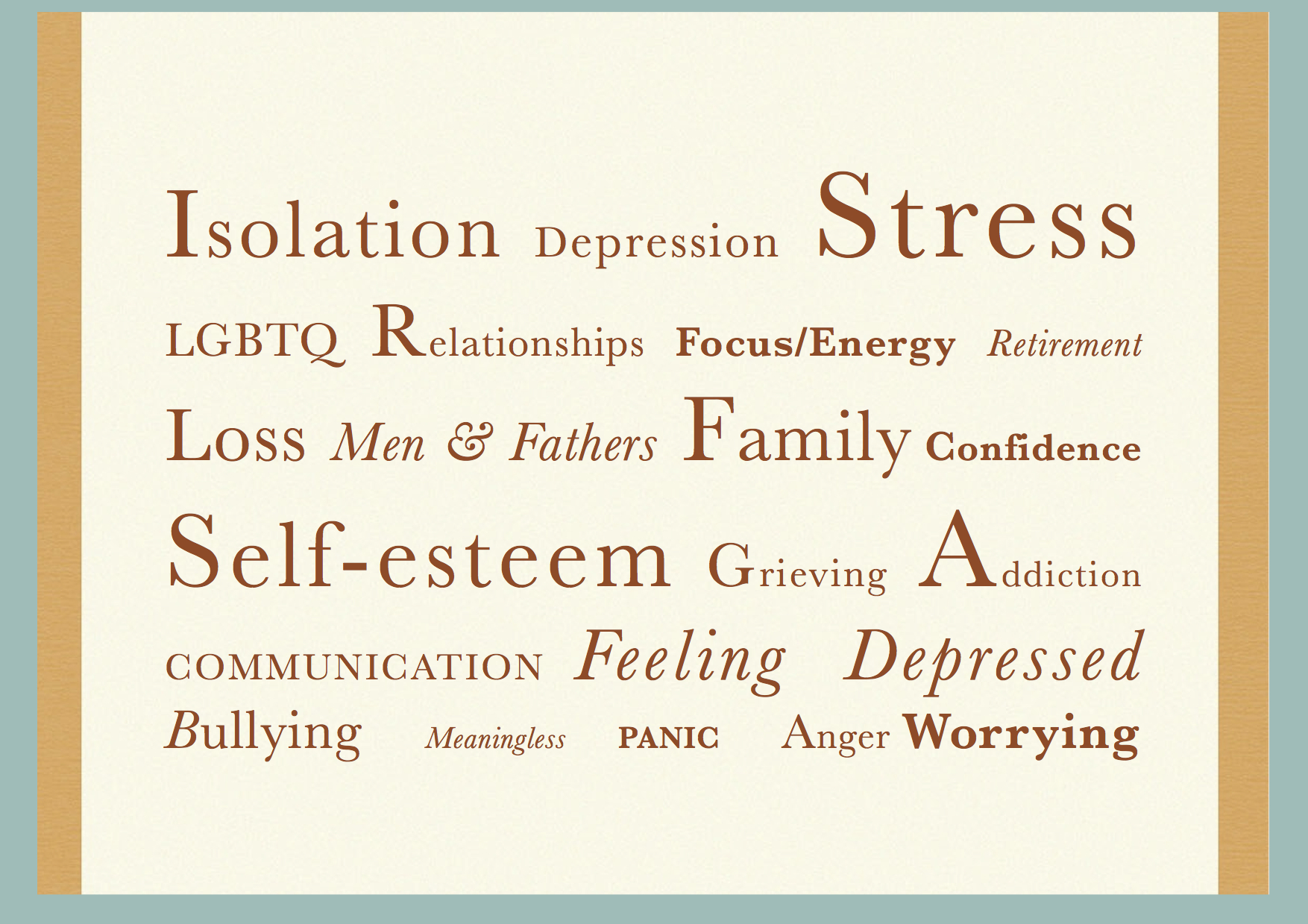Depression
Understanding Depression
How do you know if you are depressed? How depressed do you need to feel before seeking support? Is there a 'depressed enough' point you reach before looking for help? This page will help you to decide if seeking the support of a counsellor is what you need right now.
Everyone who experiences depression and feeling depressed does so in a unique way. It feels deeply personal. Often it is experienced with a sense of weakness, shame or failure which can cause feelings of isolation and hopelessness.
But before you read any further it is important to know that Depression is an illness.
Depression is not a consequence of weakness or failure. Depression has symptoms and causes. It is diagnosed by health professionals and it is treated by health professionals.
Types of Depression
Mild Depression
Moderate & Severe Depression
Post-natal Depression
Bi-Polar Depression
Seasonal Affective Disorder (SAD)
Depression can manifest physically, psychologically and socially. Ask Yourself the following questions - the answers will help you to decide if you feel you need the support and the treatment counselling & psychotherapy can offer.
Depression - Facts
Depression is very common.
Depression affects men, women and children
It affects people of any age
From all backgrounds
Experiencing depression can happen once or repeatedly in a person's lifetime
Depression may occur in response to something specific happening, like a death or loss of employment.
Physical Symptoms - Ask Yourself
How is your energy level?
Any unexplained aches & pains?
How is your appetite - has it changed?
Has your sleeping changed?
Is your speech/movement lethargic (slow)?
Notice any changes to your menstrual cycle?
Social Symptoms - Ask Yourself
How is work, are you coping/stressed?
Feeling less social? avoiding friends?
How are things at home?
Have you lost interest in hobbies/activities?
Are you cancelling social arrangements?
Is it difficult to follow conversations?
Do you feel isolated in a crowd?
Can you hold eye contact?
Are you fumbling with words?
Do you find people are not hearing you?
Psychological Symptoms - Ask Yourself
Are you anxious, worried a lot?
Do you feel irritable, intolerant of others?
How's your motivation?
Are you feeling suicidal?
Do you think of harming yourself?
What is your general mood? Low/sad?
Causes of Depression - Ask Yourself
Depression may occur as a reaction to the affects of a combination of mental health issues.
Unexpected challenges and life changes like Retirement, Divorce, Bereavement can cause depression.
Psychological challenges and personality traits ( e.g. prolonged low self-esteem ).
Can be hereditary and run in the family.
It may be due to factors like substance misuse, social isolation, illness, and stressful life events.
Some women are vulnerable to post-natal depression which may be caused by hormonal and the physical changes experienced during and after pregnancy.
How I Can Help
Depression, Feeling Depressed, Feeling unable to express yourself, Loss of meaning and direction, Isolation, Self-esteem & self-confidence, Feeling unable to communicate with family and friends, Hopelessness
Integrative psychotherapy and counselling, which is the type of therapy I practise, will provide the support and environment where you can explore the origins of the challenges you are experiencing. Counselling and psychotherapy actively promote self-awareness and self-reliance.
Also with the use of Cognitive Behavioural Therapy (CBT) techniques, which have also proven effective in Depression Counselling, you will begin to understand and recognise your thoughts, feelings, behaviours in the present moment.
Outcomes of Counselling for Depression
Explore what depression means to you
Understand why you experience depression
Receive support through current difficulties
Find new & meaningful ways to cope
Understand what makes you depressed, the origins of your depression
Explore any underlying causes
Create safeguards and signposts to stir you away from depressive episodes
Move towards a more hopeful state of mind
Mild and moderate depression interventions may also include recommendations to exercise, to eat healthy foods to boost the immune system, to self-care and be active in your recovery. Severe depression may also require prescribed medication from your GP as well as attending counselling.
“Counselling is the consistent treatment recommended for all types of depression.”
Unable to express yourself, Loss of meaning & direction, Isolation, Self-esteem & self-confidence, Stuck in a rut, Unable to communicate with family and friends, Hopelessness
Tags & Titles: Coping with Depression, Depression Counselling & Psychotherapy, Symptoms of Depression, Understanding Depression, Depression Ireland, Your Mental Health & Depression, Severe Depression & Chronicity, Reactive (& Endogenous) Depression, Depressive Illness, Clinical Depression, Anti-depressants


